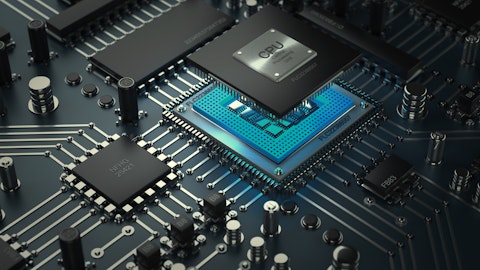Global M&A activity has been going at full speed and it does not look like it’s going to stop this year although we might see some incremental slowdown. According to FT, in each of the past four years, there were over $3.0 trillion worth of M&A activity, even though this value has been declining slightly each year. In 2017, the total value of deal making in M&A space amounted to $3.5 trillion, down by 1% over the year and the lowest level since 2014.
Judging by the healthy economy and strong outlook, it is expected that there will be more deals this year, after the final month of 2017 ended with a number of important transactions, including CVS Health Corp (NYSE:CVS)’s acquisition of Aetna Inc (NYSE:AET) for $69 billion, and the sale of the majority of Twenty-First Century Fox Inc (NYSE:FOXA) by Walt Disney Co (NYSE:DIS) for $66 billion.
Overall, the United States saw 5,326 deals worth a combined $1.26 trillion last year, according to Mergermarket, compared to 5,325 deals worth $1.5 trillion in 2016. At the same time, the share of US deals accounted for 40.2% of the global value, the lowest since 2012 and down by over 5 percentage points over the year.

bleakstar/Shutterstock.com
To get a better idea about where the US M&A activity is heading and what the current opportunities are in the market, we have conducted an interview with Brett Buckley, the Event Driven Strategist at WallachBeth Capital. WallachBeth is a leading provider of institutional execution services, offering a full spectrum of solutions to help its clients navigate increasing complex markets. Among the firm’s expertise is ETF and equity trading, derivatives, healthcare research and capital markets.
Prior to joining WallachBeth Capital, Brett Buckley, who has over 20 years of institutional buy-side experience regarding capital commitment decisions, analysis and trading across multiple instruments and securities, had worked as Managing Director at Dolphin Partners for 15 years. At Dolphin, Mr. Buckley was responsible for investing in risk arbitrage and other special situations.
At WallachBeth, Brett Buckley is part of the event driven team which is responsible for the firm’s proprietary risk arbitrage strategy. The team, in part, employs a quantitative approach which scores metrics associated with an announced merger or acquisition. The scoring assigns a deal grade, with which they can curate each deal based on overall risk.
Mr. Buckley explains further:
“The analysis is designed to answer the question, does the rate of return and/or market imputed deal possibly make sense, given the strengths and weaknesses of the particular deal situation? Since merger arbitrage is credit spread trading, akin to owning a fixed income instrument, and since the investment community rates issuers and issues of fixed income investments, it seems to me that we should develop a system to rate deals. Once we score the risks, and compare the deal probability and return to its risk cohort, we can identify which deals are mispriced and advise clients how to trade them accordingly.”
Below you can find excerpts from the interview that we conducted with Mr. Buckley, where he explains why the slowdown in M&A activity could be temporary, which industries are most likely to see more deals and what his top three M&A plays along with other opportunities he sees in the current environment are.
Q: How do you see the M&A Activity in the US and Worldwide in 2018 and in the near future?
BB: “From a macroeconomic perspective, both globally and in the US, 2018 had been setting up to become a robust year for M&A activity. Global growth and earnings are solid. Same in the US, which has an improved corporate tax rate now and the ability for US companies to repatriate offshore cash domestically at attractive one-time rates. A now rising interest rate environment serves to ultimately make merger arbitrage spreads more attractive. So does a higher volatility environment.
The frustrating factors to M&A activity at this time are temporary. Those factors that are presently chilling corporate transaction decision making are two-fold, in my view.
1) The highly unusual legal challenge by the DOJ of AT&T’s proposed acquisition of Time Warner has caused uncertainty with respect to regulatory approval odds. Unusual in that it is a so-called “vertical” merger, where any antitrust concern is readily mitigated with behavioral remedies and not divestitures. Here, the DOJ demands divestitures, curiously of Time Warner’s Turner Broadcasting and CNN. This has served to put on hold any other would-be vertical mergers (anything a FAANG company might go do, for instance) until resolved. That case is currently being heard, with closing arguments this Monday April 30th, and will be decided sometime in the next several weeks.
2) Global trade tensions brought by the current administration, specifically with China, have also cooled off deal making activity prospects. Specifically, in the semiconductor industry, or anywhere really where China’s antitrust approval is needed, as there is a fear that they will “weaponize” that process in response to our trade measures. This has not happened yet, and we do not believe the Chinese will ultimately do that, as it serves to hurt them more than us. China is still largely a state-subsidized, export-driven economy without a sufficient internal consumer base like the US has. We believe these trade issues will be resolved in the coming months. Once those two issues are behind us, there should be a robust resumption of deal activity like what we began to see early into 2018.”
Q: Do you see more M&A deals in the US to be done by domestic companies, or are we more likely to see foreign players, like Chinese companies trying to enter the US market?
BB: “I believe that the lower US corporate income tax rate encourages both US and foreign companies to make US acquisitions. However, the more protectionist tone taken by this administration will likely reduce foreign, certainly Chinese, acquirers. So, the net of that is more US acquirers on the margin, in my view.”
Q: What are the top industries that are more inclined towards consolidation and, therefore are more likely to see more M&A deals in the near future?
BB: “Everyone is a target in the semiconductor industry. Presuming AT&T prevails, you will likely see a lot of verticals executed by the FAANGs, along the line of Whole Foods being acquired by Amazon for example.”
Q: What are your top three M&A plays right now? Why these deals?
BB: “1) NXP Semiconductors NV/ Qualcomm, Inc. (NXPI/QCOM): NXPI = $127.50 cash, currently trading ~$105, estimated downside mid-$110s. We feel that the NXPI situation is compelling. It is trading arguably below a level it should trade in the event of a deal break. It is only awaiting China’s MofCom approval. As discussed above, the fear of that process being “weaponized” we feel is overdone. Even if QCOM doesn’t acquire NXPI, there are other opportunities for NXPI.
2) Time Warner Inc/AT&T (TWX/T): TWX = $53.75 cash + $53.75 in T shares subject to a collar, currently trading ~$9, estimated downside ~$8. As also discussed, we feel that AT&T will prevail in court vs. the DOJ trying to block its acquisition of Time Warner. That spread is still very attractive; as well there is not a lot of downside for TWX and they also have other opportunities should the DOJ prevail. Adjusting for the option values of the deal collar, the spread is ~$7.
3) GGP Inc./Brookfield Property Partners LP (GGP/BPY): GGP = $23.50 cash + 1 BPY or newly issued BPR US REIT, subject to a 39% stock / 61% cash proration, currently trading $19.25, estimated downside $18.50. There are some moving parts to this and it is difficult to hedge, but there are ways to do it, so that’s the opportunity. No regulatory approvals, should close in August.”
Q: What other risk arbitrage opportunities do you see in the current market environment?
BB: “We’ve done a lot of work on Altaba (AABA), formerly Yahoo!. It is a possible value with a catalyst situation where the after-tax sum of the parts, depending on what management can achieve, can unlock demonstrable upside value, with little downside risk if hedged out reasonably. Not strictly announced pending definitive risk arbitrage, but in the realm for sure.”
For more information please feel free to contact WallachBeth Capital’s event driven team at Sales@wallachbeth.com.





